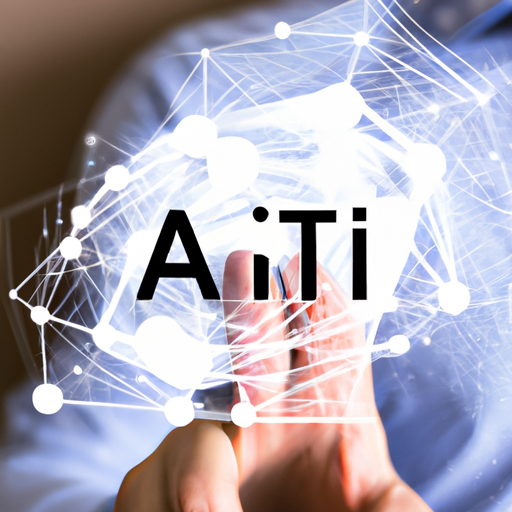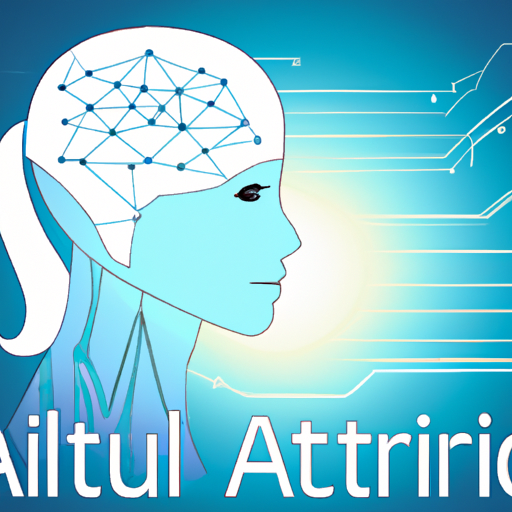-
Table of Contents
- Introduction
- What is Artificial Intelligence and How Does it Work?
- The History of Artificial Intelligence and Its Impact on Society
- The Benefits and Challenges of Artificial Intelligence
- The Different Types of Artificial Intelligence
- The Future of Artificial Intelligence and Its Potential Impact
- Ethical Considerations of Artificial Intelligence and Its Use
- Conclusion
“Unlock the Power of AI – Learn the Basics of Artificial Intelligence Today!”
Introduction
Introduction to Artificial Intelligence (AI) is a field of study that focuses on the development of computer systems that can think and act like humans. AI is a rapidly growing field of research and development, and its applications are becoming increasingly important in many areas of our lives. AI is used in a variety of industries, from healthcare to finance, and it is becoming increasingly important in the development of new technologies. AI is also being used to create autonomous vehicles, robots, and other intelligent systems. AI is a complex and rapidly evolving field, and it is important to understand the basics of AI in order to understand its potential and its implications for our future.
What is Artificial Intelligence and How Does it Work?
Artificial Intelligence (AI) is a branch of computer science that focuses on creating intelligent machines that can think and act like humans. AI is a broad field that encompasses many different technologies, including machine learning, natural language processing, robotics, and computer vision.
At its core, AI is a set of algorithms and techniques that allow machines to learn from data and make decisions without being explicitly programmed. AI algorithms are designed to recognize patterns in data and use that information to make decisions. For example, a machine learning algorithm might be trained on a large dataset of images and then be able to recognize objects in new images.
AI algorithms can be used to solve a variety of problems, from predicting stock prices to recognizing faces in photos. AI can also be used to automate tasks that would otherwise require human labor, such as driving a car or playing a game of chess.
AI is a rapidly evolving field, and new technologies are being developed all the time. AI is already being used in many different industries, from healthcare to finance, and its applications are only growing. As AI continues to develop, it will become increasingly important for businesses to understand and leverage its potential.
The History of Artificial Intelligence and Its Impact on Society
The history of artificial intelligence (AI) dates back to the 1950s, when the first computers were developed. AI is the science of creating machines that can think and act like humans. It has been used in a variety of fields, from medicine to robotics, and has had a profound impact on society.
In the 1950s, AI was first developed as a way to solve complex problems. Early AI systems were designed to mimic human behavior, such as playing chess or solving mathematical equations. These early systems were limited in their capabilities, but they laid the groundwork for more advanced AI systems.
In the 1960s, AI began to be used in more practical applications. AI was used to control robots, which could be used in manufacturing and other industries. AI was also used to develop computer vision systems, which could recognize objects and respond to commands.
In the 1970s, AI began to be used in more complex tasks, such as natural language processing and expert systems. Natural language processing allowed computers to understand and respond to human language, while expert systems allowed computers to make decisions based on a set of rules.
In the 1980s, AI was used in a variety of applications, such as medical diagnosis and financial analysis. AI was also used to develop autonomous vehicles, which could drive themselves without human intervention.
In the 1990s, AI was used in a variety of fields, such as computer vision, natural language processing, and robotics. AI was also used to develop virtual assistants, which could respond to voice commands and carry out tasks.
Today, AI is used in a variety of fields, from healthcare to finance. AI is used to diagnose diseases, analyze financial data, and even drive cars. AI is also used to develop virtual assistants, which can respond to voice commands and carry out tasks.
AI has had a profound impact on society. It has enabled us to automate many tasks, which has increased efficiency and productivity. AI has also enabled us to develop more accurate medical diagnoses and financial analysis. AI has also enabled us to develop autonomous vehicles, which can drive themselves without human intervention.
Overall, AI has had a significant impact on society. It has enabled us to automate many tasks, which has increased efficiency and productivity. AI has also enabled us to develop more accurate medical diagnoses and financial analysis. AI has also enabled us to develop autonomous vehicles, which can drive themselves without human intervention.
The Benefits and Challenges of Artificial Intelligence
The use of Artificial Intelligence (AI) has become increasingly prevalent in recent years, and its potential applications are vast. AI is a form of computer technology that is designed to simulate human intelligence and behavior. It can be used to automate processes, improve decision-making, and even create new products and services. AI has the potential to revolutionize many industries, from healthcare to finance, and its use is becoming more widespread.
The benefits of AI are numerous. AI can be used to automate mundane tasks, freeing up time for more creative endeavors. It can also be used to improve decision-making, as AI algorithms can analyze large amounts of data quickly and accurately. AI can also be used to create new products and services, as it can be used to identify patterns and trends in data that may not be obvious to humans. Finally, AI can be used to improve customer service, as AI-powered chatbots can provide quick and accurate responses to customer inquiries.
However, there are also some challenges associated with AI. One of the biggest challenges is the potential for bias in AI algorithms. AI algorithms are only as good as the data they are trained on, and if the data is biased, then the algorithm will be as well. Additionally, AI algorithms can be difficult to interpret, as they are often based on complex mathematical models. This can make it difficult to understand why a particular decision was made. Finally, AI can be expensive to implement, as it requires specialized hardware and software.
In conclusion, AI has the potential to revolutionize many industries, but it also comes with some challenges. It is important to be aware of these challenges and to take steps to mitigate them. With the right approach, AI can be a powerful tool for improving decision-making, automating processes, and creating new products and services.
The Different Types of Artificial Intelligence
Artificial Intelligence (AI) is a rapidly growing field of technology that has the potential to revolutionize the way we live and work. AI is a broad term that encompasses a variety of different types of technology, each with its own unique capabilities and applications. In this article, we will explore the different types of AI and their uses.
The first type of AI is known as narrow AI, or weak AI. This type of AI is designed to perform specific tasks, such as facial recognition or playing a game of chess. Narrow AI is used in a variety of applications, from self-driving cars to virtual assistants.
The second type of AI is known as general AI, or strong AI. This type of AI is designed to be able to think and reason like a human. General AI is still in its infancy, but it has the potential to revolutionize the way we interact with technology.
The third type of AI is known as super AI. This type of AI is designed to be able to think and reason at a level that surpasses human capabilities. Super AI is still in its early stages of development, but it has the potential to revolutionize the way we interact with technology.
Finally, the fourth type of AI is known as artificial general intelligence (AGI). This type of AI is designed to be able to think and reason like a human, but at a much higher level. AGI is still in its early stages of development, but it has the potential to revolutionize the way we interact with technology.
In conclusion, there are four main types of AI: narrow AI, general AI, super AI, and artificial general intelligence. Each type of AI has its own unique capabilities and applications, and each has the potential to revolutionize the way we interact with technology.
The Future of Artificial Intelligence and Its Potential Impact
The future of Artificial Intelligence (AI) is an exciting prospect, with the potential to revolutionize many aspects of our lives. AI is a rapidly growing field of computer science, which involves the development of computer systems that can think and act like humans. AI has already been used in a variety of applications, such as medical diagnosis, autonomous vehicles, and natural language processing.
As AI technology continues to develop, its potential impact on our lives will become increasingly significant. AI has the potential to revolutionize the way we work, live, and interact with each other. For example, AI could be used to automate mundane tasks, freeing up time for more creative pursuits. AI could also be used to improve decision-making processes, allowing us to make more informed decisions. Additionally, AI could be used to improve healthcare, allowing for more accurate diagnoses and treatments.
AI could also have a profound impact on the economy. AI could be used to automate many of the processes involved in manufacturing, allowing for more efficient production and lower costs. AI could also be used to improve customer service, allowing for more personalized experiences. Additionally, AI could be used to improve financial services, allowing for more accurate predictions and better investment decisions.
Finally, AI could have a major impact on our social lives. AI could be used to improve communication, allowing us to interact with each other more effectively. AI could also be used to improve education, allowing for more personalized learning experiences. Additionally, AI could be used to improve security, allowing for more accurate identification and authentication.
In conclusion, the potential impact of AI on our lives is immense. AI has the potential to revolutionize the way we work, live, and interact with each other. As AI technology continues to develop, its potential impact on our lives will become increasingly significant.
Ethical Considerations of Artificial Intelligence and Its Use
The use of artificial intelligence (AI) is becoming increasingly prevalent in our society, and with this comes a need to consider the ethical implications of its use. AI is a powerful tool that can be used to automate processes, improve decision-making, and even replace human labor. However, it is important to consider the ethical implications of its use, as AI can be used to make decisions that have a significant impact on people’s lives.
One of the primary ethical considerations of AI is the potential for bias. AI systems are only as good as the data they are trained on, and if the data is biased, then the AI system will be too. This can lead to decisions that are unfair or discriminatory, and can have a negative impact on people’s lives. It is therefore important to ensure that AI systems are trained on unbiased data, and that any potential biases are identified and addressed.
Another ethical consideration of AI is privacy. AI systems often require access to large amounts of data, which can include personal information. It is therefore important to ensure that any data used by AI systems is collected and used responsibly, and that appropriate measures are taken to protect people’s privacy.
Finally, it is important to consider the potential for AI to be used for malicious purposes. AI systems can be used to automate malicious activities such as fraud or cyber-attacks, and it is important to ensure that appropriate measures are taken to prevent this from happening.
In conclusion, the use of AI brings with it a number of ethical considerations that must be taken into account. It is important to ensure that AI systems are trained on unbiased data, that appropriate measures are taken to protect people’s privacy, and that appropriate measures are taken to prevent AI from being used for malicious purposes.
Conclusion
In conclusion, Artificial Intelligence is a rapidly growing field of technology that has the potential to revolutionize the way we live and work. It has the potential to automate mundane tasks, improve decision-making, and create new opportunities for businesses and individuals alike. As AI technology continues to evolve, it is important to stay informed and understand the implications of its use. With the right knowledge and understanding, AI can be used to create a better future for everyone.



